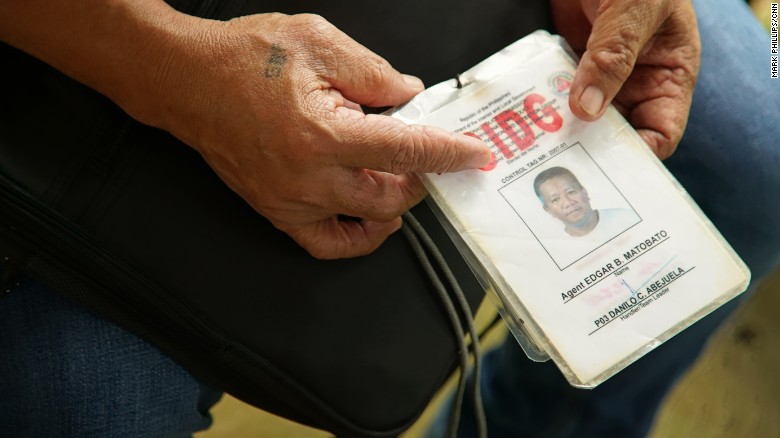Killer with a conscience: Could this former death squad member bring down Duterte?
Edgar Matobato's days are spent -- for now, at least -- in a verdant, bucolic compound some way outside Manila.
Chickens, ubiquitous in the rural Philippines, scratch in the dirt and there is a sizable supply of food stacked up on the porch of one of the small structures that make up the compound.
It's a far cry from his nightmarish former life as a self-described death squad lieutenant in the southern city of Davao.
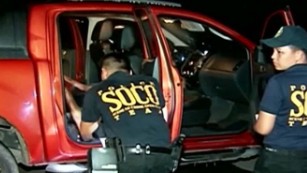
Former hitman: Duterte ordered me to kill
He won't be here forever, though. He, along with his wife and two children, has been moved at least 10 times -- although he says he's lost count -- in the past year.
The necessity for the constant moves originated with a change in his conscience, a slow transformation from around 2000 to 2013, when he says he realized that he was sowing chaos, murdering the poor and innocent, and serving evil.
He's been under witness protection and remains in hiding. He has an outstanding case against his former boss and the Philippines' current president, Rodrigo Duterte, who is under investigation by the country's Human Rights Commission.
Philippines President Duterte admits killing suspects
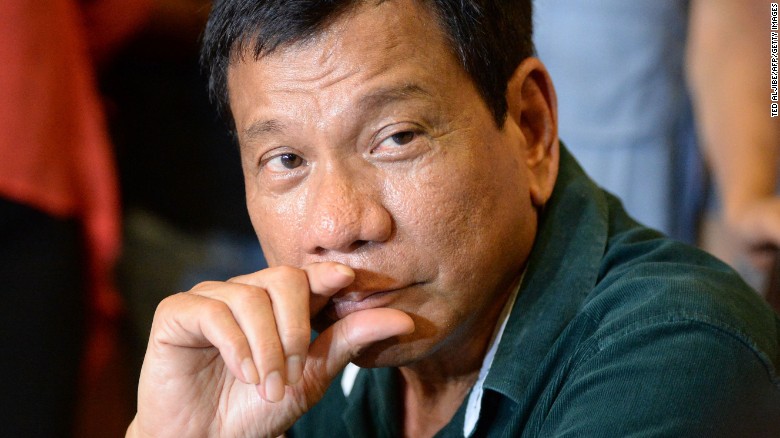
President Duterte: 5 outrageous quotes
Warrant pending
The government also has an arrest warrant out for him -- for not showing up in court on charges of possession of illegal firearms -- and has also charged him with a kidnapping in 2002.
Even though he's claimed to have killed dozens of people, they wouldn't dare charge him with murder, he says, as that would be an admission of wrongdoing on the part of the Duterte administration.
After decades in the employ of the Davao City government -- as an assassin, he says -- Matobato has now turned against his former paymaster.
In testimony to the Philippines Senate in September, Matobato said he was part of the DDS, which he alleges was run on the orders of Duterte.
"Our work was to kill criminals like drug pushers, rapists, snatchers," he testified at the time. "Those were the people we killed every day."
CNN has not independently confirmed Matobato's allegations.
Duterte's office denied the claims made by Matobato under oath, and said the President was "unfazed" by the Senate investigation.
Philippines scraps inquiry into alleged extrajudicial killings
Secrecy at all costs
We are met on the road by his handlers some distance away from the compound, a necessary caution. He's in danger of being killed himself these days, as a key witness to -- and actor in -- what he says was a series of unspeakable crimes from 1988 to 2013.
During that time he says he was part of the Davao Death Squad (DDS), an allegedly state-sanctioned group of murderers who, alongside him, he says, killed as many as 1,400 people in the southern city under then-Mayor Duterte.
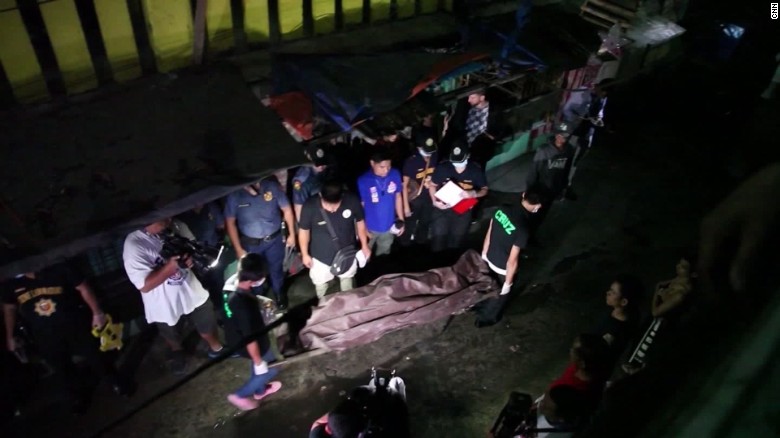
Philippines president says he killed criminals
At first, he thought he was doing something just: ridding his town of bad people. But over the course of his career as a hit man he came to realize that he wasn't on the side of justice. In 2010, he says, he was ordered to kidnap and kill bodyguards and associates of one of Duterte's political rivals. Of the four bodies they dumped in the sea, two resurfaced.
It was one of the incidents that chipped away at an already dented conscience, leading to his recent claim that he was a killer for Duterte.
Another time, he recalls, three young women suspected of dealing shabu -- the local name for methamphetamine -- were bound, beaten and raped by DDS members, then killed.
Philippines President Rodrigo Duterte: What's he accused of?
Marked for death

$120m worth of meth seized in Philippines bust
His former colleagues -- who numbered 300 at the height of the group's existence -- would kill him if they find him, he says matter-of-factly.
"I don't care anymore if they want to kill," he says. "What I want to do now is to tell the truth and not to lie anymore."
He wants to atone for the wrongs of his life in the DDS, and as a fervent Catholic, he says that he believes his God will forgive him, such is his genuine remorse.
He wears a sizable wooden cross outside his tight, white polo shirt and he says he is ready to face the judgment -- in this life or the next -- that his past demands.
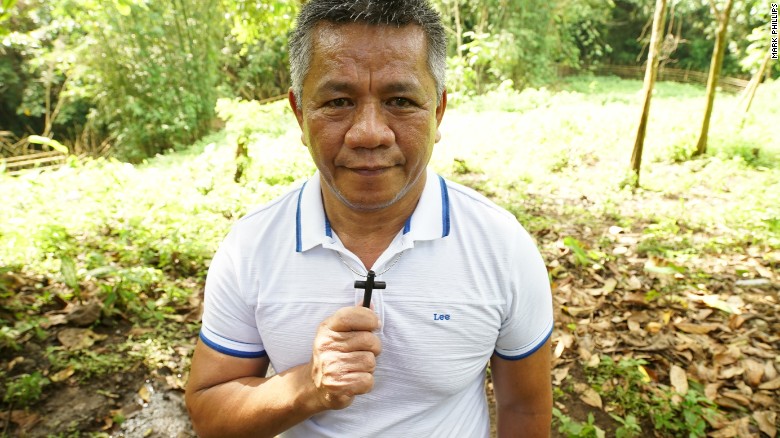
Edgar Matobato, a devout Catholic, tells CNN he feels God will forgive him for the estimated 50 murders that he says he committed.
For his part, Duterte has dismissed the 57-year-old as a liar and said he doesn't remember him, but Matobato tells CNN that he murdered around 50 people in a 24-year career as a hit man as part of the DDS; criminals and political rivals of the then-mayor in his hometown, the largest city in Mindanao in the country's restive south.
Duterte's press secretary, Martin Andanar, says that the DDS is nothing but a myth.
"Everybody talks about the death squad," he tells CNN.
"There is the Philippines National Police. That's the authority. The death squad, the Davao Death Squad that people are talking about -- this is all legend. It's a legend. There is no death squad. There is the police and there is (the) AFP (Armed Forces of the Philippines)."
Kidnap, murder
Matobato remembers it differently. Most often the DDS would kidnap their victims, he tells CNN, take them to a quiet part of town -- like a quarry -- and kill them before dismembering the bodies, dousing them in oil to keep them from smelling as they decomposed and burying them, or dumping them at sea, Matobato says.
For those disposed of at sea, they'd hack open their victims' chest cavities, to ensure that the corpses sank, he recalls.
He says that the orders mostly came from a ranking police officer, but on occasion, he says, Duterte himself would order the killings.
In 1993, after the bombing of the city's cathedral, Matobato says, Duterte personally told him and other DDS members, in the mayoral office, to go to a mosque and kill Muslims in reprisal for the terror attack.
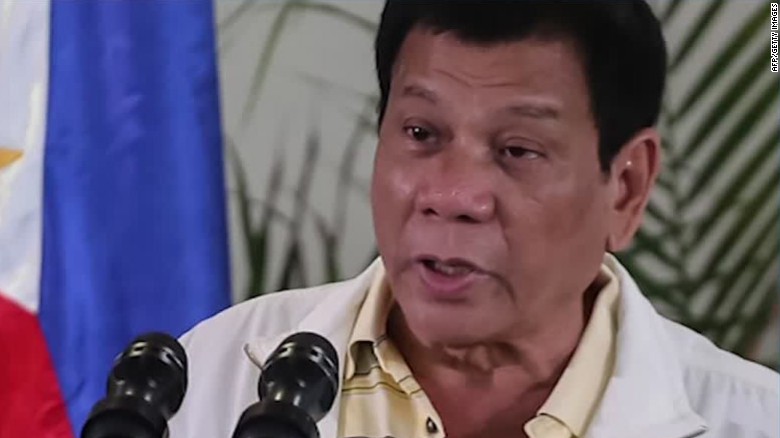
Philippines president admits to killings
On a different occasion, he alleges Duterte shot and killed a National Bureau of Investigation agent after a traffic altercation led to a shootout. The then-mayor emptied two full magazines of bullets into the agent, he said.
Alleged Duterte hitman denied protection after tell-all testimony
Parallels with war on drugs
In the six months since Duterte took office as president, lurid images of extrajudicial killings crop up every morning in Filipino newspapers -- vigilante justice, or police operations known as "buy busts" that invariably end in the death of the alleged dealer.
Matobato says they bear the hallmarks of those perpetrated by the DDS -- faces bound in electrical tape, crude cardboard signs around the victims' necks, proclaiming their alleged crimes.
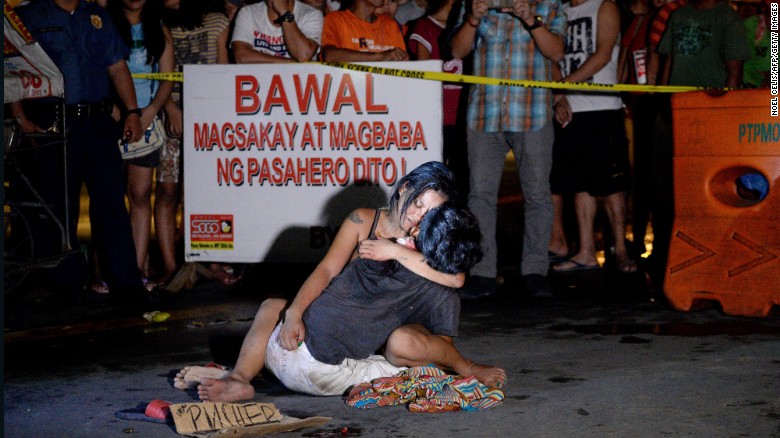
Photos: Philippines drug crackdown
A woman cradles her husband, next to a placard which reads "I'm a pusher," who was shot dead in Manila on July 23, 2016.
Hide Caption
1 of 9
Photos: Philippines drug crackdown
Police patrol a shanty community at night during curfew on June 8, 2016 in Manila. Philippine police have been conducting frequent night raids and revived a curfew for minors that has not been enforced for years.
Hide Caption
2 of 9
Photos: Philippines drug crackdown
Some 1,000 people whom authorities accused of being drug users and dealers take an oath before local authorities after turning themselves in in Tanauan, the Philippines, on July 18, 2016. Philippine President Rodrigo Duterte swept to power on a promise to clamp down on drugs in a two-month crime blitz, encouraging police and even civilians to shoot drug dealers. The country has seen a surge in killings of suspected dealers.
Hide Caption
Philippines drug crackdown
A man authorities accused of being a drug user is fingerprinted during the mass surrender of some 1,000 alleged drug users and pushers in the Philippine town of Tanauan, located about 37 miles (60 kilometers) south of Manila on July 18, 2016.
A social worker gives counseling to those who have turned themselves in for drug-related crimes in the Philippines on July 18, 2016.
He says DDS operatives would carry an extra, cheap pistol with them to dump near the bodies, claiming a shootout took place.
Almost all the police "buy bust" operations end with similar reports, and the morning papers' crime scene photos often feature handguns next to sprawled, bloodied bodies. Matobato says he's seen former DDS colleagues in Manila.
"Members of the DDS are already ... in Manila," he says. "The policemen in Davao City are capable of killing... They don't have a soul, these members from Davao."
Showdown at the top of Philippines politics: What you need to know
Killer hired for a pittance
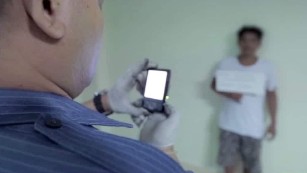
Philippine senator opposes Duterte's drug war
Officially a security official under the employ of City Hall, Matobato says that he and the other DDS members were rarely called upon to do their official duties -- "such as securing the port" -- but mostly were just used to carry out extrajudicial killings. He, and the others, were paid P5000 ($100) a month for their work, he told CNN.
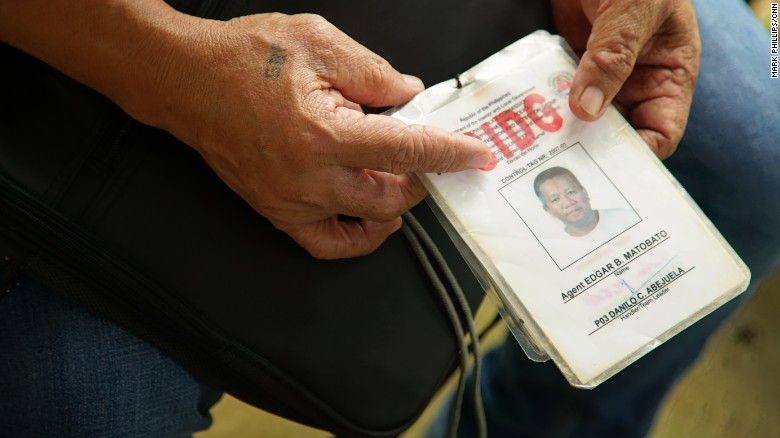
Matobato shows CNN his Davao City government ID.
Others had tried to get out, he says, but at least one former member was run over shortly after trying to escape the group's clutches.
He says that he begged to get away from the butchery, but in 2014 the kidnap and murder of a businessman was pinned on him. He insists he had nothing to do with it.
"They tortured me and kept me for a week. Every night they will torture me. My relatives helped me and I got out."
He told his wife of his grisly past and together with their two kids they fled the city and, later, went into the Human Rights Commission's witness protection program. Even though the HRC is an independent government agency, Matobato left its program when Duterte became president.
And earlier this year, he took the witness stand to speak out about the group's bloody work.
But presidential spokesman Andanar says that the testimony of the self-declared former killer, who only has a first-grade education, is "very inconsistent" and not to be trusted.
"If you go through the transcript of the Senate you will see for yourself that Matobato is lying through his teeth," he says.
After he first testified at the Senate inquiry into alleged extrajudicial killings, Matobato was placed under the protection of a private citizen.
And now, a life interrupted; a series of furtive moves around the countryside, never knowing if he will suffer the same violent death he says he meted out so many times.
He wants his testimony to bring down the President, a man he says is no more than a bloody butcher who has carried over his brutal methods from Davao onto the national stage.
"(Duterte) should pay for all his sins. If the death penalty (is reinstated), I wish he will be the first to be hanged.
"Then I will follow. Yes, I am willing to follow."
News Courtesy: www.cnn.com

